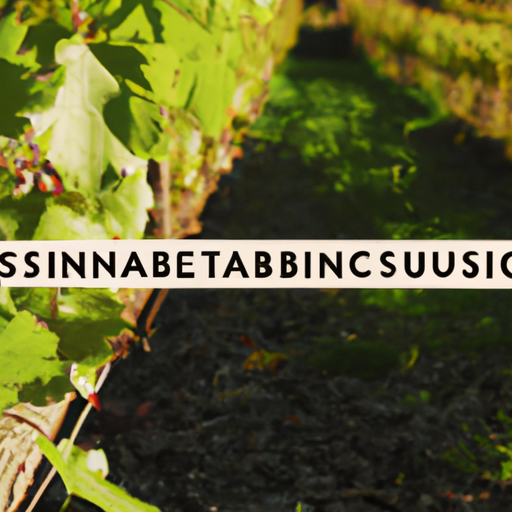
Organic Winery Certifications: Exploring the Benefits and Requirements
Organic Winery Certifications: Exploring the Benefits and Requirements
In recent years, there has been a growing interest in organic winery certifications as consumers become more conscious of the environmental impact of their choices. Organic winery certifications provide a way for wineries to demonstrate their commitment to sustainable practices and offer consumers the assurance that the wines they are purchasing are produced in an environmentally responsible manner. In this article, we will explore the benefits and requirements of organic winery certifications.
One of the primary benefits of organic winery certifications is the positive impact on the environment. Organic wineries follow strict guidelines that prohibit the use of synthetic pesticides, herbicides, and fertilizers. Instead, they rely on natural methods to control pests and enhance soil fertility. This reduces the amount of harmful chemicals released into the environment and helps to preserve biodiversity. By choosing wines from certified organic wineries, consumers can support these environmentally friendly practices.
Another benefit of organic winery certifications is the potential health benefits associated with organic farming practices. Organic wineries prioritize the use of natural and organic inputs, which means that the grapes used to produce the wine are grown without the use of synthetic chemicals. This can result in wines that are free from pesticide residues, making them a healthier choice for consumers. Additionally, organic wineries often use lower levels of sulfites, which can be a concern for individuals with sulfite sensitivities.
To obtain organic winery certifications, wineries must meet specific requirements. These requirements vary depending on the certifying body, but generally include the use of organic farming practices, such as the prohibition of synthetic chemicals and the implementation of soil and water conservation measures. Wineries must also maintain detailed records of their farming practices and undergo regular inspections to ensure compliance with the certification standards.
One of the most well-known organic winery certifications is the USDA Organic certification. This certification is issued by the United States Department of Agriculture and requires wineries to meet strict standards for organic farming practices. In addition to the USDA Organic certification, there are also several other certifying bodies that offer organic winery certifications, such as Demeter, which focuses on biodynamic farming practices, and CCOF, which certifies organic operations in California.
While organic winery certifications offer many benefits, they also come with challenges. Transitioning to organic farming practices can be a time-consuming and costly process for wineries. It often requires significant changes to farming methods and may result in lower yields in the short term. Additionally, organic wineries may face challenges in marketing their products, as organic wines often come with a higher price tag due to the increased costs associated with organic farming.
In conclusion, organic winery certifications provide wineries with a way to demonstrate their commitment to sustainable practices and offer consumers the assurance that the wines they are purchasing are produced in an environmentally responsible manner. These certifications come with numerous benefits, including positive impacts on the environment and potential health benefits for consumers. However, they also come with challenges, such as the transition to organic farming practices and the higher costs associated with organic production. By choosing wines from certified organic wineries, consumers can support sustainable practices and make a positive impact on the environment.
Biodynamic Winery Certifications: Understanding the Principles and Practices

Biodynamic winery certifications have gained significant attention in recent years as consumers become more conscious of sustainable practices in the wine industry. These certifications go beyond organic farming methods and focus on a holistic approach to winemaking that considers the entire ecosystem. In this article, we will explore the principles and practices behind biodynamic winery certifications.
At its core, biodynamic winemaking is based on the principles outlined by Rudolf Steiner in the early 20th century. Steiner believed that a farm should be a self-sustaining organism, with all elements working together in harmony. This philosophy extends to winemaking, where the goal is to create wines that are not only of high quality but also reflect the unique characteristics of the vineyard and its surroundings.
One of the key principles of biodynamic winemaking is the use of biodynamic preparations. These preparations are made from natural materials such as plants, minerals, and animal manure, which are then fermented and applied to the soil and plants. The goal is to enhance the vitality and fertility of the soil, promoting healthy vine growth and minimizing the need for synthetic fertilizers and pesticides.
Another important aspect of biodynamic winemaking is the use of the lunar calendar. Biodynamic practitioners believe that the position of the moon and other celestial bodies can influence the growth and development of plants. As a result, vineyard activities such as planting, pruning, and harvesting are timed according to the lunar cycle. This practice is believed to enhance the quality and flavor of the grapes.
In addition to these principles, biodynamic wineries also prioritize biodiversity and ecosystem preservation. They strive to create a balanced ecosystem by planting cover crops, maintaining hedgerows, and providing habitats for beneficial insects and animals. This approach not only supports the health of the vineyard but also contributes to the overall health of the surrounding environment.
To obtain biodynamic winery certification, wineries must meet strict criteria set by various organizations. One of the most well-known certifying bodies is Demeter International, which has been certifying biodynamic farms and wineries since 1928. Demeter certification requires adherence to the principles outlined by Rudolf Steiner, as well as regular inspections and audits to ensure compliance.
Another prominent certification body is Biodyvin, which was founded in France in 1995. Biodyvin focuses on promoting biodynamic winemaking practices and certifies wineries based on their commitment to biodynamic principles. They also require wineries to undergo blind tastings to assess the quality of their wines.
In recent years, other organizations such as the Organic Winegrowers New Zealand and the California Certified Organic Farmers have also developed their own biodynamic certification programs. These programs provide additional options for wineries seeking recognition for their sustainable practices.
In conclusion, biodynamic winery certifications are a testament to the commitment of wineries to sustainable and holistic winemaking practices. These certifications go beyond organic farming methods and encompass principles such as the use of biodynamic preparations, adherence to the lunar calendar, and the preservation of biodiversity. By obtaining biodynamic certification, wineries demonstrate their dedication to producing high-quality wines while minimizing their impact on the environment.
LEED Certification for Wineries: Promoting Sustainability in the Wine Industry
Sustainable Winery Certifications: A Comprehensive List
In recent years, there has been a growing interest in sustainability within the wine industry. Wineries around the world are recognizing the importance of adopting environmentally friendly practices to minimize their impact on the planet. One way wineries can demonstrate their commitment to sustainability is by obtaining certifications that validate their efforts. One such certification is the LEED Certification for Wineries.
LEED, which stands for Leadership in Energy and Environmental Design, is a globally recognized certification program that promotes sustainable building and development practices. Originally developed by the U.S. Green Building Council (USGBC) for the construction industry, LEED has expanded to include certifications for various sectors, including wineries.
To obtain LEED Certification for Wineries, wineries must meet specific criteria in several categories, including sustainable site development, water efficiency, energy and atmosphere, materials and resources, indoor environmental quality, and innovation in design. These categories cover a wide range of sustainability practices, from using renewable energy sources to reducing water consumption and implementing recycling programs.
One of the key benefits of LEED Certification for Wineries is that it helps wineries reduce their environmental footprint. By implementing sustainable practices, wineries can minimize their use of natural resources, reduce waste generation, and lower their greenhouse gas emissions. This not only benefits the environment but also helps wineries save on operational costs in the long run.
LEED Certification for Wineries also provides wineries with a competitive advantage in the market. With consumers becoming increasingly conscious of the environmental impact of their purchasing decisions, wineries that can demonstrate their commitment to sustainability are more likely to attract environmentally conscious consumers. Additionally, LEED-certified wineries may also be eligible for certain incentives and grants that can further support their sustainability efforts.
While LEED Certification for Wineries is a widely recognized and respected certification, it is not the only certification available to wineries. There are several other certifications that wineries can pursue to showcase their commitment to sustainability.
One such certification is the Certified Sustainable Winegrowing (CSW) certification. Developed by the California Sustainable Winegrowing Alliance (CSWA), this certification focuses specifically on sustainable practices in vineyard management and winemaking. To obtain CSW certification, wineries must meet rigorous standards in areas such as water and energy conservation, soil health, pest management, and social responsibility.
Another certification that wineries can consider is the Demeter Biodynamic certification. Biodynamic farming takes a holistic approach to agriculture, considering the farm as a self-sustaining ecosystem. Wineries that obtain Demeter Biodynamic certification must adhere to strict guidelines that cover not only organic farming practices but also the use of biodynamic preparations and the incorporation of lunar and cosmic rhythms into farming activities.
Other certifications that wineries may pursue include the ISO 14001 Environmental Management System certification, the Fairtrade certification, and the Salmon-Safe certification, among others. Each certification has its own set of criteria and focuses on different aspects of sustainability.
In conclusion, sustainability is becoming increasingly important in the wine industry, and wineries are recognizing the need to adopt environmentally friendly practices. LEED Certification for Wineries is one of the certifications available to wineries that can validate their sustainability efforts. However, it is not the only certification, and wineries can choose from a range of certifications that focus on different aspects of sustainability. By obtaining these certifications, wineries can demonstrate their commitment to sustainability, reduce their environmental footprint, and attract environmentally conscious consumers.






